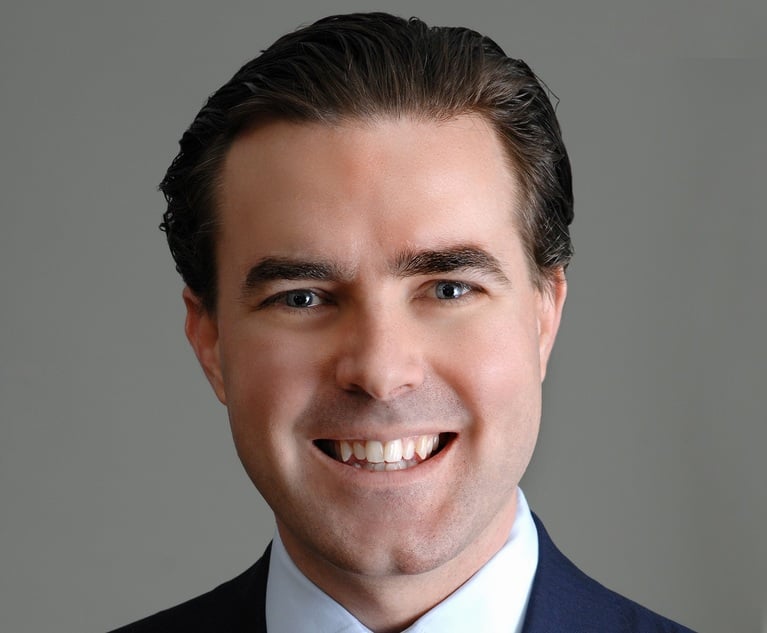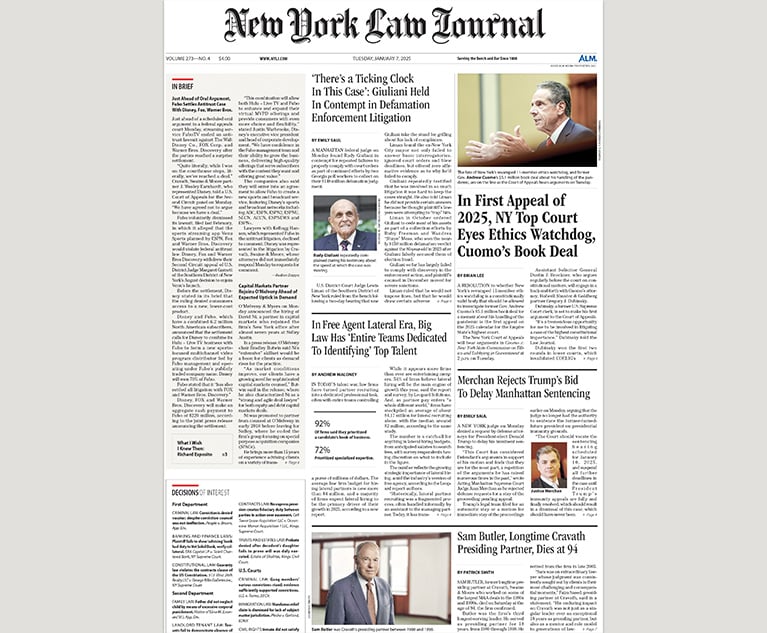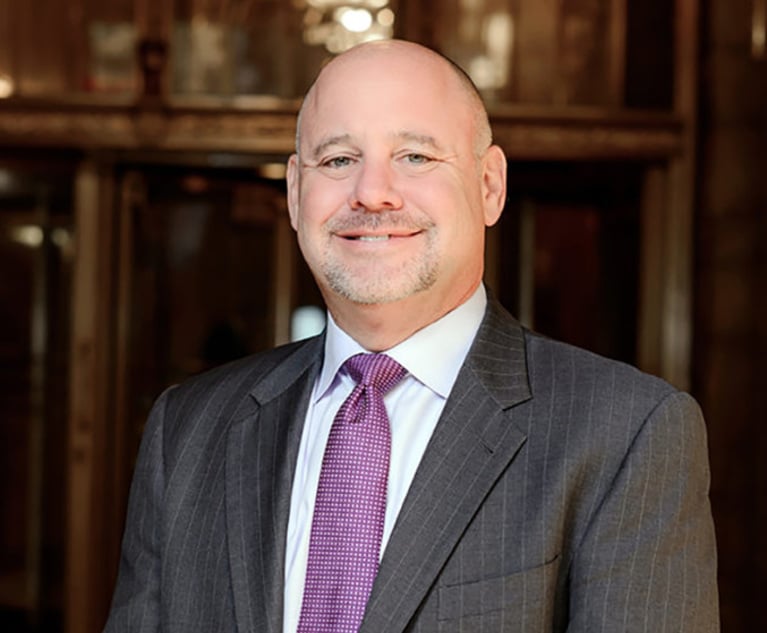Wachtell Blasts 'Futile' New Claims in CVR Malpractice Case
As it continues to duel with Carl Icahn-controlled CVR Energy, Wachtell argues its own initial engagement letter with former client CVR was "a mere agreement to agree" and thus not enforceable.
September 10, 2018 at 03:05 PM
4 minute read
 Billionaire activist investor Carl Icahn speaks with attendees during a charity event in New York on May 19, 2015. (Photo: Victor J. Blue/Bloomberg)
Billionaire activist investor Carl Icahn speaks with attendees during a charity event in New York on May 19, 2015. (Photo: Victor J. Blue/Bloomberg)
Battling CVR Energy, Wachtell, Lipton, Rosen & Katz argues it's far too late for the Carl Icahn-controlled company to add new claims to its legal malpractice suit against the firm. Further, Wachtell claims, its own initial engagement letter with CVR was “too indefinite to be enforceable.”
Wachtell has been battling CVR Energy's legal malpractice lawsuit for nearly five years. The refining and fertilizer company is alleging Wachtell failed to advise that CVR would face claims by Deutsche Bank AG and The Goldman Sachs Group Inc. for $36 million under the terms of engagement letters with the banks.
Seeking to amend the suit, CVR said last week it had learned that Wachtell based its $6 million legal fee to CVR on the amount charged by the investment banks, which, the company claims, was not consistent with the terms of the law firm's engagement letter with CVR.
CVR is asking a federal judge for permission to add new claims to the malpractice lawsuit for breach of contract and breach of the covenant of good faith and fair dealing and to seek punitive damages.
CVR, in a redacted letter last week to U.S. District Judge Richard Sullivan of the Southern District of New York, said the proposed additions stem from information “we learned late in discovery.”
But in a late Sept. 7 filing, Wachtell's counsel, Michael Shuster, a partner at Holwell Shuster & Goldberg, urged Sullivan to reject the additions, saying CVR “unreasonably waited” to add the claims until after the close of fact discovery.
Wachtell says CVR is “injecting new legal and factual issues into a claim that the parties have been litigating for five years” and says CVR's “sole excuse” is that those claims are based on information it learned from SEC testimony transcripts it received in July. (The U.S. Securities and Exchange Commission investigated whether CVR Energy properly disclosed the structure of investment bank fees it agreed to prior to Icahn's successful 2012 takeover bid.)
Wachtell said the SEC testimony at issue—by the individual defendants in the malpractice suit, Wachtell partners Benjamin Roth and Andrew Brownstein—concerned factors that the firm considered in determining its legal fee to CVR for its services in 2012.
CVR could have elicited that information from Wachtell during fact discovery years ago, Wachtell says, adding, “CVR's conduct is the antithesis of diligence.” Further, an amended complaint raises the specter of more depositions of the people who discussed and approved Wachtell's fee, including CVR's general counsel and its entire board of directors, the law firm claims.
Wachtell also argues the proposed new claims are “futile,” citing the terms of a one-page attachment to its engagement letter to CVR. That document notes that the firm says its “expectation is that upon conclusion of the matter or from time to time upon the achievement of major milestones, our final compensation will be agreed with you, mutually and reasonably, and will reflect the fair value of what we have accomplished for the company.”
Citing a Second Circuit case, Wachtell contends a “purported contract that leaves the compensation term to be determined by future negotiations—like the engagement letter here—is 'a mere agreement to agree' and under New York law is deemed too indefinite to be enforceable.”
Wachtell argued this is confirmed by the parties' subsequent written fee agreement. Following CVR board's approval in April 2012 to pay a $6 million legal fee to Wachtell, Wachtell partner Brownstein contacted Edmund Gross, the former general counsel, to request he countersign an attached fee letter on behalf of CVR, which Gross did, according to Shuster's letter. That fee letter confirms a $6 million fee for “legal services.”
“CVR's proposed amendment is frivolous—a term we do not use lightly. Wachtell Lipton has waited long enough to defeat CVR's malpractice claim on the merits,” Shuster wrote.
Herbert Beigel, CVR's attorney in the malpractice suit, said Shuster's court letter is “factually inaccurate in a number of respects,” declining further comment.
This content has been archived. It is available through our partners, LexisNexis® and Bloomberg Law.
To view this content, please continue to their sites.
Not a Lexis Subscriber?
Subscribe Now
Not a Bloomberg Law Subscriber?
Subscribe Now
NOT FOR REPRINT
© 2025 ALM Global, LLC, All Rights Reserved. Request academic re-use from www.copyright.com. All other uses, submit a request to [email protected]. For more information visit Asset & Logo Licensing.
You Might Like
View All
DLA Piper NY Office Adds Ex-Verizon GC As Big Law Goes on In-House Hiring Spree
Trending Stories
- 1Stevens & Lee Names New Delaware Shareholder
- 2U.S. Supreme Court Denies Trump Effort to Halt Sentencing
- 3From CLO to President: Kevin Boon Takes the Helm at Mysten Labs
- 4How Law Schools Fared on California's July 2024 Bar Exam
- 5'Discordant Dots': Why Phila. Zantac Judge Rejected Bid for His Recusal
Who Got The Work
Michael G. Bongiorno, Andrew Scott Dulberg and Elizabeth E. Driscoll from Wilmer Cutler Pickering Hale and Dorr have stepped in to represent Symbotic Inc., an A.I.-enabled technology platform that focuses on increasing supply chain efficiency, and other defendants in a pending shareholder derivative lawsuit. The case, filed Oct. 2 in Massachusetts District Court by the Brown Law Firm on behalf of Stephen Austen, accuses certain officers and directors of misleading investors in regard to Symbotic's potential for margin growth by failing to disclose that the company was not equipped to timely deploy its systems or manage expenses through project delays. The case, assigned to U.S. District Judge Nathaniel M. Gorton, is 1:24-cv-12522, Austen v. Cohen et al.
Who Got The Work
Edmund Polubinski and Marie Killmond of Davis Polk & Wardwell have entered appearances for data platform software development company MongoDB and other defendants in a pending shareholder derivative lawsuit. The action, filed Oct. 7 in New York Southern District Court by the Brown Law Firm, accuses the company's directors and/or officers of falsely expressing confidence in the company’s restructuring of its sales incentive plan and downplaying the severity of decreases in its upfront commitments. The case is 1:24-cv-07594, Roy v. Ittycheria et al.
Who Got The Work
Amy O. Bruchs and Kurt F. Ellison of Michael Best & Friedrich have entered appearances for Epic Systems Corp. in a pending employment discrimination lawsuit. The suit was filed Sept. 7 in Wisconsin Western District Court by Levine Eisberner LLC and Siri & Glimstad on behalf of a project manager who claims that he was wrongfully terminated after applying for a religious exemption to the defendant's COVID-19 vaccine mandate. The case, assigned to U.S. Magistrate Judge Anita Marie Boor, is 3:24-cv-00630, Secker, Nathan v. Epic Systems Corporation.
Who Got The Work
David X. Sullivan, Thomas J. Finn and Gregory A. Hall from McCarter & English have entered appearances for Sunrun Installation Services in a pending civil rights lawsuit. The complaint was filed Sept. 4 in Connecticut District Court by attorney Robert M. Berke on behalf of former employee George Edward Steins, who was arrested and charged with employing an unregistered home improvement salesperson. The complaint alleges that had Sunrun informed the Connecticut Department of Consumer Protection that the plaintiff's employment had ended in 2017 and that he no longer held Sunrun's home improvement contractor license, he would not have been hit with charges, which were dismissed in May 2024. The case, assigned to U.S. District Judge Jeffrey A. Meyer, is 3:24-cv-01423, Steins v. Sunrun, Inc. et al.
Who Got The Work
Greenberg Traurig shareholder Joshua L. Raskin has entered an appearance for boohoo.com UK Ltd. in a pending patent infringement lawsuit. The suit, filed Sept. 3 in Texas Eastern District Court by Rozier Hardt McDonough on behalf of Alto Dynamics, asserts five patents related to an online shopping platform. The case, assigned to U.S. District Judge Rodney Gilstrap, is 2:24-cv-00719, Alto Dynamics, LLC v. boohoo.com UK Limited.
Featured Firms
Law Offices of Gary Martin Hays & Associates, P.C.
(470) 294-1674
Law Offices of Mark E. Salomone
(857) 444-6468
Smith & Hassler
(713) 739-1250









